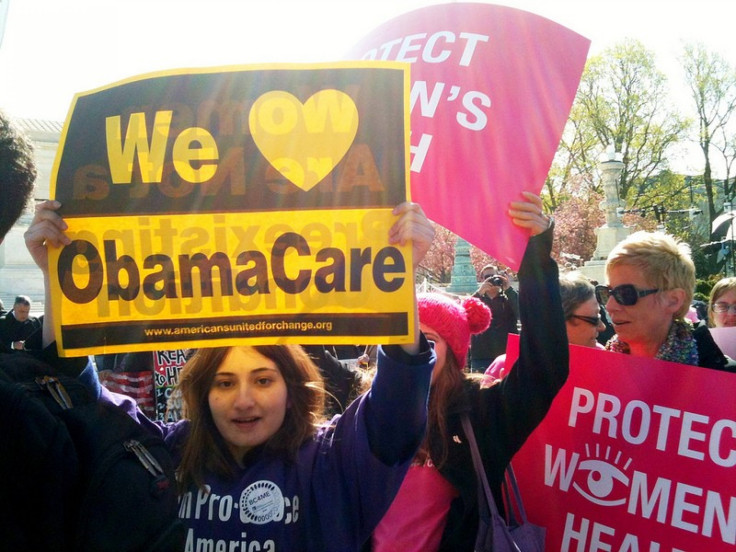ObamaCare Will Benefit Cancer Patients, Caregivers
Opinion

Cancer strikes without regard to political parties. Over time, one in two men and one in three women will hear the dreaded words, “You have cancer.
In fact, 75 percent of households will find themselves caring for a cancer patient at some point during their lives. No matter their political persuasion, cancer patients and caregivers will benefit from the next stages of Affordable Care Act, or ACA, implementation.
Cancer poses a plethora of challenges -- physical, psychological, emotional, social, logistical, and financial -- to both cancer patients and their families. The costs of unreimbursed medical care, even for people who have health insurance, caused 62 percent of personal bankruptcies in 2007, according to a study by Harvard researchers. For patients’ family caregivers, every hour spent agonizing about insurance and financial issues is an hour that’s not supporting the cancer patient’s primary needs: sustaining normalcy, maintaining hope, and restoring health.
The future of the ACA has been hanging in limbo since its passage in 2010, leaving cancer families wondering if future treatments would be covered, for how long, and with what financial impact on the rest of the family. Family caregivers bear the brunt of the financial stresses associated with a cancer diagnosis while the patient is otherwise engaged, often fighting for his or her life. Regardless of the outcome for the cancer patient, research has found that severe and prolonged cancer caregiving can measurably shorten a caregiver’s life.
The 2012 election results provide certainty that the law will be implemented, freeing caregivers to focus on providing patient care and support. The passage of the Affordable Care Act was intended to ensure access to quality care with maximum quality of life, minimum administrative complexity, and significantly reduced financial stress. It will ensure that all Americans will have:
- Health insurance coverage. Access to insurance coverage will be available even for those who change jobs, and coverage must be approved or continued regardless of gender or pre-existing conditions like cancer. No one will need to worry about an insurer canceling coverage or -- effective January 1, 2014 -- being charged more when they receive a cancer diagnosis.
- Earlier cancer detection. The earlier a cancer is detected, the more likely it is to be treatable and survivable. Effective January 1, 2013, the act provides for reduced or no-cost preventive and screening services for breast, colorectal, and prostate cancer, three of the most prevalent cancers.
- More Extensive Medicare Drug Coverage. The Medicare Part D prescription cap in coverage (known as the “donut hole”) will be narrowed over time and eventually eliminated by 2020.
- Longer coverage for children (even those with cancer.) Children up to the age of 26 can continue to maintain coverage under parents’ health insurance policies.
- No lifetime limits (now) or annual limits on payments (by 2014), so patients won’t have to postpone treatments for fear of costs being incurred after an arbitrary limit has been reached.
- Coverage for Clinical Trials. Beginning on January 1, 2014, coverage will be provided for anyone eligible to participate in a clinical trial that is appropriate to treat the patient’s condition. Clinical trials represent treatments that are working their way out of the research pipeline into early commercialization. For patients facing certain life-threatening cancers, trials can represent the keys to longer life and potential survival.
The mechanics for implementation are still being developed by both states and insurance carriers, so much remains to be defined and communicated over the months ahead.
But two uncertainties remain that are important to cancer families as Congress confronts the need to agree on “fiscal cliff” deficit reductions.
Mandated budget cuts that are scheduled to take effect January 1, if Congress doesn’t reach prior agreements, would jeopardize Federal (National Institutes of Health) funding for cancer research, clinical trials, and breast and cervical cancer screening programs for low-income, uninsured, and under-insured women.
Additionally, action is still needed on provisions for maintaining adequate drug reimbursements to office-based physicians who administer drug treatments covered by Medicare Part B.
In spite of these two uncertainties, a sigh of relief is timely and appropriate for cancer-affected families. Their focus now can be on managing their loved ones’ treatment processes, supporting them in their day-to-day living, and maintaining their hope for a cancer-free future. These focal points are the core of what effective cancer caregiving is all about.
Deborah J. Cornwall is an experienced advocate on behalf of cancer patients and their families, working with the Cancer Action Network, the legislative advocacy affiliate of the American Cancer Society. She is also the author of "Things I Wish I’d Known: Cancer Caregivers Speak Out."
© Copyright IBTimes 2024. All rights reserved.





















